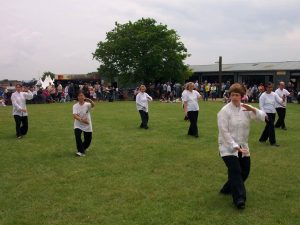FAQs - Frequently Asked Questions

When do the courses start?
Students can join at any time, though most classes generally follow the academic year and holiday breaks.
I have a number of commitments that may mean intermittent attendance. Is that okay?
If you really want to progress, especially with Tai Chi Chuan, consistent attendance is essential, particularly in the first year. Learning Qigong is easier, but if you want to be able to perform the routines at home or on holiday, a bit of effort will still be required to remember them.
What do the lessons consist of?
All classes begin with a short warm up routine incorporating gentle stretches followed by a Qigong sequence as a continuation of the warm-up, and this may include a variety of different sequences. Most Qigong is done standing on one spot with little or no moving about. Following a short break, the class turns its attention to Tai Chi Chuan. Here you will learn its solid foundations such as posture, leg stances, stepping and various hand and foot techniques.
There are many different Tai Chi Chuan sequences (forms) varying in length and complexity, and beginners will usually start with a short sequence which hopefully will give them a sense of achievement in a comparatively short time. It is important to emphasise that everyone is encouraged to work at their own pace and not to “run before you can walk”, although some will pick it up more quickly than others.
How long does it take to learn Tai Chi Chuan?
This is a question asked many times by new students and I always reply – how long is a piece of string? The time it takes to commit a sequence of moves to memory and learn to execute those moves in a reasonably able manner will vary a lot from person to person. Tai Chi Chuan is a journey and really doesn’t matter how long it takes. In fact, most regular practitioners and teachers would say that it is a life-long endeavour.
As with learning a musical instrument, quality counts and although it looks very easy, its grace and elegance belie its complexity and new students should not expect too much of themselves too quickly. The core principle of Tai Chi Chuan is that of a calm mind and relaxed body.
What should I wear?
Comfortable clothing is usually preferred – something roomy or stretchy, perhaps jogging bottoms or leggings and a loose top, plus trainers or soft shoes with a little bit of grip, or just bare feet. Some people wear their usual day-to-day wardrobe.
Will I have to lie or sit on the floor?
No. All the movements are done standing, and mostly involve moving about as well.
My balance is terrible these days – do I have to stand on one leg?
Studies have shown that Tai Chi Chuan is especially good for improving balance and preventing falls and although many of the forms include moves where one leg is raised, you will definitely not be expected to risk falling over. The unsteady student can simply replace that bit of the move with a ‘heel touch’ and then continue with the sequence as before. If at any time a student feels the need to use a chair for extra support during some of the ‘standing still’ exercises or sit down they can do so.
I find I don’t have a great deal of energy to spare – how physically demanding is it?
It’s very gentle and the emphasis is always to work within your capabilities and not to place stress any muscles, ligaments or joints in any way. Breathing and posture are also very important.
Does it matter how old I am?
Not at all. Age is no barrier to learning Tai Chi Qigong, or Tai Chi Chuan.
Get In Touch
©Pushing The Waves 2024 – Privacy Policy